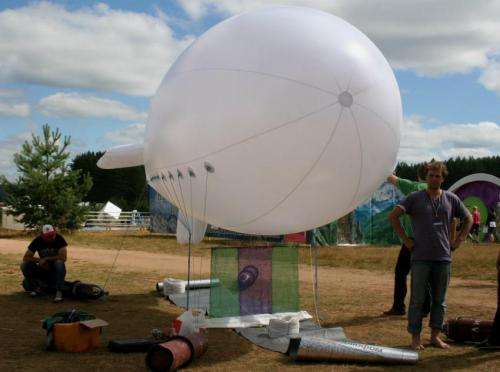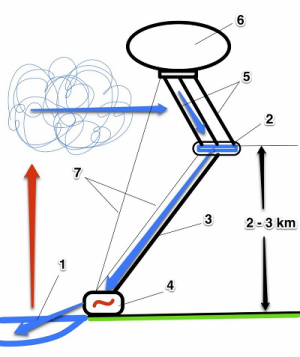September 10, 2014 weblog
Group looking to fund cloud water harvesting project

A small group of Russian technologists, led by inventor Andrew Kazantsev, is looking to raise $14,000 with an Indiegogo project that seeks to build a full scale air hydroelectric station (Air HES)—its purpose is to extract water from clouds to power a turbine on the ground and to provide clean drinking water to people below.
The project looks to combine technologies that already exist—extracting water from clouds, for example has been done for hundreds if not thousands of years, though up till now, it's been in the form of wringing water from fog. High flying balloons too have been around for a long time, as have turbines. The idea itself isn't the first of its kind either, Nikolai Tesla actually proposed a similar scheme back in 1915.
The Air HES prototype consists of an aerostat, which is essentially a weather balloon, a water collecting unit, and a ground based turbine. The water collecting unit is a mesh sheet that captures water droplets in a cloud (at about 7000 feet) and funnels it below to a tube that extends all the way to the ground. There gravity acting on the water is used to drive a turbine. The balloon can be sent higher or lower to move to where the clouds are but must remain tethered to the ground. The water collecting unit can also pull smaller amounts of moisture directly from the atmosphere when there are no clouds. The team reports that their prototype has demonstrated an ability to collect five liters of water in just one hour's time.

To find out if the idea is truly viable, the team needs to build a much larger Air HES, and for that they need money. Such a system, the team claims, could provide both electricity and water to people in isolated areas, offering a way to help those in impoverished places. If the full scale prototype is as successful as they believe it will be, the team says it will begin looking for investors to help fine tune the system, and then to manufacture and sell the finished product. They note that ideas such as theirs need to be explored as many climatology and population models suggest water shortages could become a worldwide problem as early as 2040.
More information: airhes.com/
© 2014 Tech Xplore
















